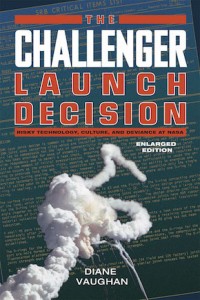The Normalization of Deviance

In his piece for the most recent issue of the Atlantic on the origins of the corporate mea culpa and its promulgation of evils, Jerry Useem turned the theory and research of Diane Vaughan, including that drawn from her book The Challenger Launch Decision:
The sociologist Diane Vaughan coined the phrase the normalization of deviance to describe a cultural drift in which circumstances classified as “not okay” are slowly reclassified as “okay.” In the case of the Challenger space-shuttle disaster—the subject of a landmark study by Vaughan—damage to the crucial O‑rings had been observed after previous shuttle launches. Each observed instance of damage, she found, was followed by a sequence “in which the technical deviation of the [O‑rings] from performance predictions was redefined as an acceptable risk.” Repeated over time, this behavior became routinized into what organizational psychologists call a “script.” Engineers and managers “developed a definition of the situation that allowed them to carry on as if nothing was wrong.” To clarify: They were not merely acting as if nothing was wrong. They believed it, bringing to mind Orwell’s concept of doublethink, the method by which a bureaucracy conceals evil not only from the public but from itself.
More explicitly, for Vaughan, the O-ring deviation decision unfolded through the actions and observations of key NASA personnel and aeronautical engineers, who grew acclimated to a culture where high-risk was the norm, and which fostered an increasing descent into poor decision-making. As the book’s jacket (and Useem) note, “[Vaughan] reveals how and why NASA insiders, when repeatedly faced with evidence that something was wrong, normalized the deviance so that it became acceptable to them.”
You can read more about The Challenger Launch Decision here, and the Atlantic piece in full on their site.